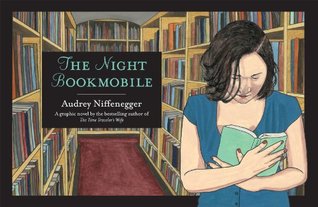 |
| Abrams |
Audrey Niffenegger
2010
The Summary
"The New York Times bestselling author of The Time Traveler's Wife and Her Fearful Symmetry, Audrey Niffenegger, has crafted her first graphic novel after the success of her two previous critically acclaimed novels-in-pictures, The Three Incestuous Sisters and The Adventuress.
"The Night Bookmobile tells the story of a wistful young woman who one night encounters a mysterious disappearing library on wheels. This library includes everything, and only everything, she has ever read. Seeing her history and most intimate self in this library, she embarks on a search for the bookmobile. But over time her search turns into an obsession she longs to be reunited with her own collection and therefore, her memories.
"The Night Bookmobile is a haunting tale both of transcendence and the passion for books, and features the evocative full-color pen-and-ink work of one of the world's most beloved storytellers."
The Good
I read The Night Bookmobile at the suggestion of a coworker, and I found I was fascinated by the notion of a library existing that contains every single item that you have ever read. It reminded me a bit of the Archive in Jim Butcher's Dresden Files, and I couldn't help but be intrigued by the premise of Niffenegger's graphic novel.
Truthfully, I love the idea that every piece of information ever written is collected somewhere, tucked away in some supernatural library that can only be accessed by the right people. It's something that has enchanted me for years, and I was glad to see it enacted in another story. However, I'm not sure what to make of the way The Night Bookmobile handled the matter. I'm still trying to figure out how it makes me feel.
Overall, The Night Bookmobile is a curious story. It's not a tragedy, per se, but it isn't exactly a happy little story about a woman and her library. It makes you think, it makes you feel things you might rather not feel, and it makes you question your own mortality...and wonder, what exactly, you will leave behind.
The Bad
I'm really not sure what to make of The Night Bookmobile.
It's intriguing, but it leaves me feeling slightly squeamish. I mean, as a reader, I love books. I must have 400 books in my house alone, not counting the bag I keep packed full of library books or the random copies I keep squirreled away in my desk for a rainy day; however, I don't believe my adoration of books has ever turned into something unhealthy.
The narrator of The Night Bookmobile is a young woman who encounters a mysterious library, a collection of books in the back of a Winnebago that reflect each and every book she's ever read, and it sparks an obsession. It's based on a similar tale by H.G. Wells, "The Door in the Wall," in which a young man becomes consumed by rediscovering the verdant paradise he found behind a mysterious green door. They have many of the same undertones: obsession, desperation, an all-consuming (read: deadly) need to go back to a time and place that was, in a word, happier.
I was really bothered by the way The Night Bookmobile ended. I know I'm going to ruin the ending, I'm sorry, but I just can't adequately express how I feel about the story without telling you how it ends and how it made me feel after all is said and done. You see, The Night Bookmobile ends when the narrator commits suicide and becomes a night librarian. Shortly thereafter, she discovers her collection has been decommissioned, because, and I quote, "only the living have libraries."
Truthfully, I couldn't decide if I was bothered more by the fact the narrator committed suicide in her desperate attempt to reconnect with her library or the fact that her library--in essence, her collective knowledge, her entire sense of being and self--simply disappears. The entire story raises questions about mortality and what really matters in life...and what's leftover for the next generation.
It's haunting, and it makes me squirm. I can't decide whether I like it or whether I hate it. Part of me dislikes it, dislikes the narrator's suicide and the disappearance of her library (her knowledge); however, another part of me is intrigued by the entire thing, by the notion that all books written or read are available somewhere--and that something, however small, is left for the next generation, some semblance of knowledge is passed down and never really lost.
Like I said, I'm conflicted. As a coworker noted, The Night Bookmobile is not a book that anyone can read without feeling something, good or bad, and forming an opinion about it.
The Ugly
Suicide.
No comments:
Post a Comment